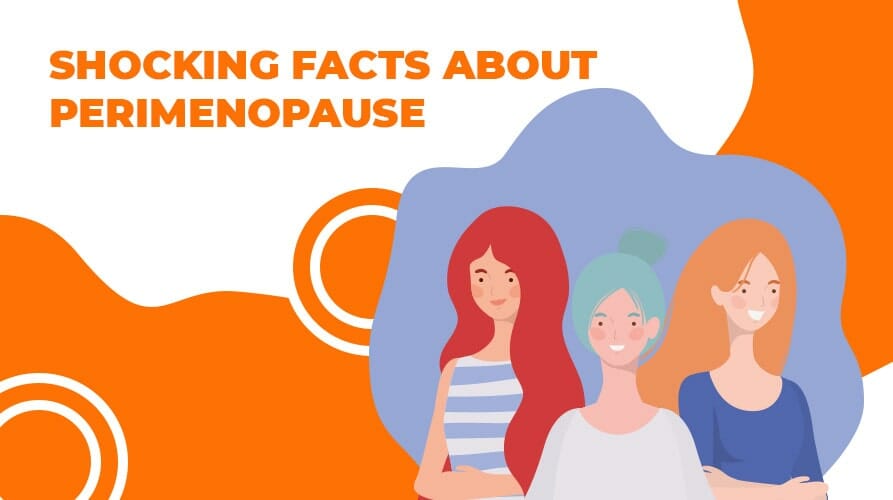Menopause is a natural and inevitable phase in a woman’s life, marking the end of her reproductive years. But the journey towards menopause, the symptoms, and how to manage them can be a confusing and often misunderstood aspect of female health. This article aims to demystify Perimenopause, Menopause, Hot Flash, and Night Sweats and provide insight into what to expect and how to manage these changes.
Perimenopause
Perimenopause is the transitional phase leading up to menopause. Typically beginning in a woman’s 40s, though it can start earlier, perimenopause is marked by a decrease in estrogen, leading to changes in the menstrual cycle and other physical and emotional symptoms.
Symptoms may include irregular periods, changes in mood, sleep disturbances, and an increase in hot flashes or night sweats. The average length of perimenopause is four years, but it can be shorter or longer for different individuals.
Menopause
Menopause occurs when a woman has not had a menstrual period for 12 consecutive months. The average age for menopause in the United States is 51, although this can vary widely.
With the decrease in estrogen production, symptoms like hot flashes, night sweats, mood changes, and vaginal dryness can become more pronounced. While some women transition through menopause with minimal discomfort, others may find the symptoms more challenging.
Hot Flashes
Hot flashes are one of the most common and well-known symptoms of menopause. A hot flash is a sudden feeling of warmth that spreads over the body, often accompanied by sweating and followed by a chill. It can last anywhere from a few seconds to several minutes.
Hot flashes can be mild or intense, and they can occur at any time, day or night. They typically begin in perimenopause and may persist for several years after menopause.
Night Sweats
Night sweats are hot flashes that occur during sleep. They can be so intense that they awaken a woman from sleep, causing discomfort and disruption to her rest.
Night sweats can lead to fatigue, irritability, and difficulty concentrating. Managing these symptoms may require lifestyle changes, adjustments in sleep environments, and potentially medical intervention.
Coping Strategies
Healthy Lifestyle Choices:
- Exercise Regularly: Engaging in physical activity can help alleviate symptoms by promoting overall well-being and reducing stress.
- Eat a Balanced Diet: Consuming a diet rich in whole grains, fruits, vegetables, and low in spicy foods can help regulate symptoms.
- Avoid Triggers: Alcohol, caffeine, and smoking can exacerbate symptoms. Identifying personal triggers and avoiding them can make a significant difference.
Medical Intervention:
- Hormone Replacement Therapy (HRT): Under a healthcare provider’s supervision, HRT can be an effective way to manage severe symptoms.
- Non-Hormonal Medications: Some antidepressants and other medications have been found effective in treating hot flashes.
- Consultation with Healthcare Providers: Regular appointments with a healthcare provider can help tailor an individualized approach.
Alternative Therapies:
- Acupuncture: This traditional Chinese medicine practice has been found to help some women with hot flashes.
- Herbal Supplements: Natural remedies such as black cohosh, red clover, and evening primrose oil may provide relief, although research varies.
- Mindfulness and Meditation: Practicing mindfulness and meditation can help manage stress, which in turn can alleviate symptoms.
Sleep Environment & Routine Adjustments:
- Keep the Room Cool: Lowering the room temperature or using fans can make night sweats more manageable.
- Wear Breathable Clothing: Cotton and other natural fibers allow the skin to breathe, reducing discomfort.
- Establish a Routine: Going to bed and waking up at the same time every day helps the body establish a rhythm, which can alleviate sleep disturbances.
Emotional Support & Education:
- Join Support Groups: Connecting with others going through similar experiences can provide emotional support and practical advice.
- Educate Yourself & Others: Understanding the changes and educating those around you can create a supportive environment.
- Consider Therapy or Counseling: Professional help can provide personalized strategies for coping with emotional and psychological changes.
Conclusion
The journey through perimenopause to menopause is a complex and personal experience. Awareness and understanding of these changes, along with open communication with healthcare providers, can empower women to navigate this transition with confidence and grace.
By embracing the challenges and changes that come with perimenopause and menopause, women can take control of their health and well-being, allowing for a smoother passage into this new phase of life. With proper support and care, the symptoms of hot flashes and night sweats can be managed, making the journey through menopause not just tolerable but a positive and empowering stage of life.
Citations – Mayo Clinic’s Website & National Institute on Aging’s Website
